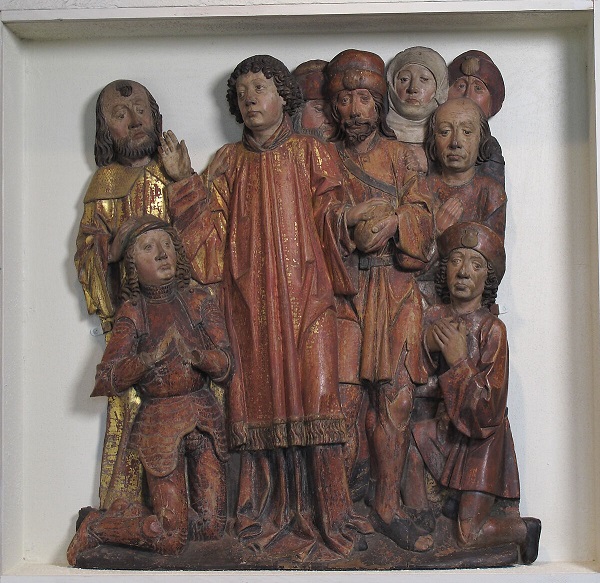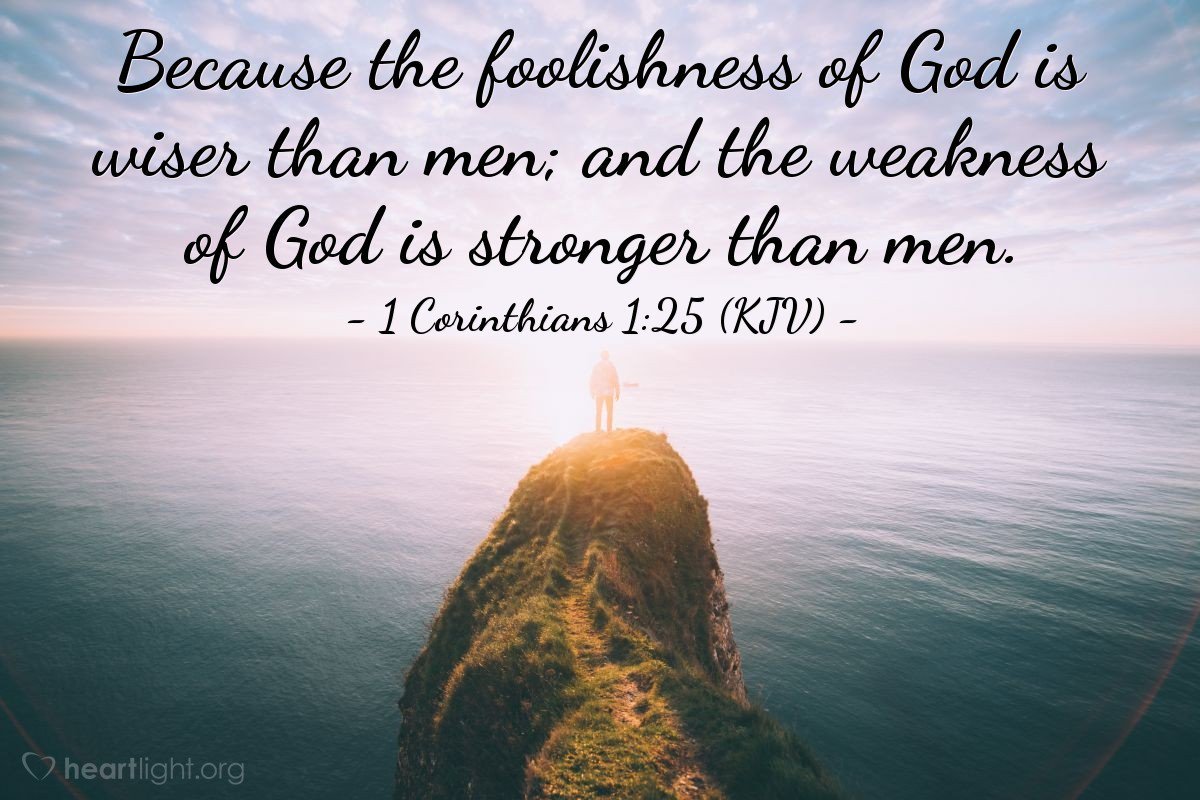Readings: 1 Kings 19:11-21 | 1 Corinthians 1:18-25 | Luke 5:1-11
Text: 1 Corinthians 1:18-25
Persecution was a daily reality for third-century Christians in Rome. And in 258, the Emperor Valerian began another massive round. He issued an edict commanding that all bishops, priests, and deacons should be put to death, and he gave the Imperial treasury power to confiscate all money and possessions from Christians.

In light of the news, Pope Sixtus II quickly ordained a young Spanish theologian, Lawrence, to become archdeacon of Rome. The important position put Lawrence in charge of the Church’s riches, and it gave him responsibility for the Church’s outreach to the poor. The pope sensed his own days were numbered and therefore commissioned Lawrence to protect the Church’s treasure.
On August 6, 258, [Emperor] Valerian captured Pope Sixtus while he celebrated the liturgy, and had him beheaded. Afterwards, he set his sights on the pope’s young protégé, Lawrence. But before killing him, the Emperor demanded the archdeacon turn over all the riches of the Church. He gave Lawrence three days to round it up.
Lawrence worked swiftly. He sold the Church’s vessels and gave the money to widows and the sick. He distributed all the Church’s property to the poor. On the third day, the Emperor summoned Lawrence to his palace and asked for the treasure. With great aplomb [poise], Lawrence entered the palace, stopped, and then gestured back to the door where, streaming in behind him, poured crowds of poor, crippled, blind, and suffering people. “These are the true treasures of the Church,” he boldly proclaimed. One early account even has him adding, “The Church is truly rich, far richer than the Emperor.”
Unsurprisingly, Lawrence’s act of defiance infuriated the Emperor. Valerian ordered his death that same day via grilling on a rack.[1]
To the unbelieving ear, it would sound as though Lawrence, featured on our bulletin cover today, was mocking the great Emperor. When he had demanded treasures, he was expecting to find gobs of money swindled from unsuspecting people in service to their foolish deity. But St. Lawrence made a “fool” out of Valerian by showing him that the foolishness of God is wiser than him.

Who in our world have been the biggest fools for the longest time? Is there anyone else as foolish as a Christian who takes their faith seriously? We’re a punchline because of what we confess. We’re a bad joke that the world has long since gotten sick of, because we hold onto our Scripture. Our faith is a scandal of the highest order. And it always has been because of Jesus’ cross. “For the word of the cross is folly to those who are perishing, but to us who are being saved it is the power of God.”
When St. Paul wrote to the Corinthians, the fact that Jesus Christ, God in the flesh, died on a cross was absolutely crazy. He called that fact a stumbling block to the Jews. We actually might understand it better from the Greek word Paul used, σκάνδαλον (skandalon). It was scandalous that the most holy and perfect God, Creator of all things, would ever be found on a cross, because to be crucified meant that you had obviously done something so bad that you had been cursed by the Lord. After all, it is written, “Cursed is everyone who hangs on a tree.” (Gal. 3:13) Even if it wasn’t what the Romans you were accused of, God still let it happen to you. So obviously, you must have done something terrible. To say that this was God hanging here? That was unthinkably scandalous. Blasphemous, in the worst of ways!
Likewise, it was absolute foolishness to the Greeks. The Greeks had grown up with all the stories about Zeus and the like. And it wouldn’t be a big deal at all for a god to come down looking like a man, and do all kinds of amazing miracles. And it wasn’t even surprising that such a god could get into trouble as well. Those weren’t the problems they had with Jesus. The problem was that Jesus died. Our God died. Silly Christians! Gods can’t die! Whoever heard of something so foolish in all their life? At the point of death, the gods would pull the mask back and show who they really were. And their immorality and power would be on full display. If your God dies, then He can’t be much of a God now, can He?
If you’re going to put the Messiah on the tree, then He’d better give a powerful sign, like coming down off of it, if you wants us to believe in him [Matt. 27:42]. If you’re going argue that God dies, then you’d better get some wisdom, and argue for something else. Jews demand signs and Greeks seek wisdom, but we preach Christ crucified, a stumbling block [scandal] to Jews and folly to Gentiles.

In two thousand years, some things have changed. And yet, nothing has changed. It may no longer be a scandal that Jesus was found in the place of sinners when He hung on a tree. But there is not much that is more scandalous than the Cross. The scandal now is that God would glorify such violence, and let His people celebrate it. If us Christians were truly good, we’d hide that cross away where no one would have to see it again. Is that cross you wear around your neck beautiful because of the artist’s design or because it is where God shows His wisdom and love?
It may no longer be foolish to believe that God dies (after, think of Friedrich Nietzsche words, “God is dead…and we have killed him,” which have been used as a soundbite to justify and describe secular philosophy[2]) But the cross is still the height of folly. For only a great fool would believe that a man killed on such a cross could ever rise from the dead on the third day. The dead stay dead. Death is permanent. Everyone who knows anything knows that. And so, the world laughs at us. And when they’ve had their fill of it, they then get angry with us. Our belief, our confession, our faith in such a cross has gotten old. And it’s time to grow up.
And you know what? We want to follow the wise. We want to be written about by their scribes. We want the debater of this age to debate on our behalf instead of against us. We want to be where they are. We crave their approval. And to get that approval, we must stop with the scandal and the folly. We must stop with this Cross. Only then will the world finally recognize us. Only then will the world finally pay attention. Only then will we get the world to come through our doors and hear us.
The cruel irony is that those who gave up that cross in order to get the world’s approval, never actually got it. Instead, they lost their very reason for even existing. It turns out you don’t actually need to go to Church to be a nice person. You don’t need to go to Church in order to help people in your community. You don’t need to go to Church to sing your favorite music. You don’t need to go to Church to feel good about yourself. And you certainly don’t need to go to Church to be spiritual.
However, there is only one place on the whole earth that preaches Christ crucified for you. And that is the Church, wherever she is found. And to us who are being saved [that Word of the cross] is the power of God. In fact, that’s how you know where the Church is. We confess that “The Church is the congregation of saints, in which the Gospel is rightly taught and the Sacraments are rightly administered.” (Augsburg Confession, Article VII) It’s the Gospel itself which delivers to us that immense foolishness of God that is His cross.

Listen to how the Church father, Origen, explains it:
The name of the cross is thought to be a stumbling block. But if someone opens his ears to the word of God and to grace, he will see that this too is a great mystery [Eph. 5:32]. Even the Gentiles hand on traditions that severe plagues or heavy rains or droughts often ceased when a person sacrificed himself for the sake of the community. Why, then, does it cause amazement that, when the whole world was suffering a plague of error, it was necessary for one man to die [John 18:14] in order to end this plague of ignorance, darkness and destruction? But who could undergo this sacrifice? Not a prophet, not an apostle, not any other righteous person. It was necessary for a divine power to descend from heaven, a power capable of taking upon itself to die on behalf of all [2 Cor. 5:15] in a way that involved public shame, so that through that death a victory over the devil might be won. And in fact, worldly victors who lead their enemies in triumphal procession (see Col. 2:14-18) are accustomed to set up trophies of victory over the defeated in the form of a cross. The cross, then, is a sign of victory over Satan.[3]
There is no other worldly way to describe the actions of Christ except as utter folly. Who would ever leave a perfect heaven in order to take part in my suffering? Who would surrender perfect holiness in order to bear my sin? Who would think that taking nails in His spotless hands and feet would ever rescue me from the hell I’ve earned for myself? Who would ever exchange His eternal life for my death? Who would ever believe that the sheer proclamation of these events to me could ever save me from my fate? Jesus has indeed come down from heaven. Incarnate by the Holy Spirit. Born of the Virgin Mary. Was made man. All for you. Jesus has indeed left His holiness behind in order to become sin on your behalf—to become your sin. And as such, He endured hell itself on that cross for you. Jesus has indeed taken those nails in His hands and feet for you. And by them, He has pulled you out of the depths of hell itself.
And even though those scars will remain on him forever, so you will remain forever with Him. Jesus has indeed sacrificed His life in order to put an end to death forever. Death is beaten. It cannot hold anyone for long, even though it does its very worst. Yet, it cannot stop the resurrection on the Last Day from coming. And He is indeed on His way with it soon. But here is the most foolish promise of all: That simply by speaking the report of these events to you, you actually receive them in their fulness.
And in this way, God chose what is foolish in the world to shame the wise. The foolishness of a cross. God chose what is weak in the world to shame the strong. the weakness of a man nailed to a tree. God chose what is low and despised in the world. A man condemned to death. Even things that are not, like a dead God, to bring to nothing things that are. Sin brought to nothing. Death brought to nothing. Hell brought to nothing. All througph the utter folly of God. And because of him you are in Christ Jesus…. For the foolishness of God is wiser than men, and the weakness of God is stronger than men. In the Name + of Jesus. Amen.

[1] Brandon Vogt, “St. Lawrence and the True Treasures of the Church.” Word on Fire, August 10, 2016. https://www.wordonfire.org/articles/st-lawrence-and-the-true-treasures-of-the-church/ (accessed 5 Jul 2023)
[2] The context of the quote is a lament where Nietzsche is reflecting on our common denial of God, on the lips of a man who is dubbed mad for calling people to account for this: “God is dead. God remains dead. And we have killed him. How shall we comfort ourselves, the murderers of all murderers?” (The Parable of the Madman, 1882)
[3] Claude Jenkins. “Origen on I Corinthians.” Journal of Theological Studies 9 (Jan 1908): 235.








